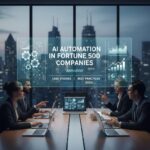AI in the workplace: Transforming organizational landscapes and redefining roles
Artificial Intelligence (AI) has transitioned from a niche technological innovation to a fundamental component of modern workplaces worldwide. The integration of AI is revolutionizing the way organizations function, make strategic decisions, and interact with both employees and customers. AI’s capabilities extend far beyond simple automation; it encompasses sophisticated algorithms that analyze vast datasets, learn from patterns, and make predictions that inform critical business decisions. This transformation is not solely technological but also cultural, impacting organizational structures, redefining job roles, and shaping the overall work environment in profound ways.
Within the workplace, AI is implemented through various applications, including intelligent virtual assistants that manage scheduling and communication, automated customer service systems that provide 24/7 support, predictive analytics that forecast market trends, and machine learning-driven decision-making tools that enhance resource allocation. These innovations aim to enhance operational efficiency, reduce costs, and cultivate a culture of ongoing innovation. The impact of AI on Work continues to evolve, with its role becoming increasingly integrated into organizational life, prompting leaders to reassess traditional approaches to management, employee engagement, and strategic planning.
The cultural shift driven by AI involves creating an environment that welcomes technological change, promotes ongoing learning, and encourages adaptability among employees. Organizations are increasingly investing in AI literacy and training programs to ensure their workforce can work effectively with intelligent systems. This change also raises important questions about data privacy, ethical AI use, and the future of human-AI collaboration, which require careful thought and responsible action. Ultimately, AI in the workplace represents a new era of operational excellence and innovation, requiring a balanced approach that harnesses its advantages while addressing its challenges.
Impact of AI on jobs: Navigating opportunities and challenges in employment
The impact of AI on jobs is one of the most exciting and debated topics in our rapidly evolving world. While AI may replace some roles—especially those involving repetitive or manual tasks—it also opens the door to innovative opportunities and new careers that we hadn’t imagined before. The automation of manufacturing, administrative work, and parts of healthcare has understandable concerns about job security. Yet, history shows us that technological progress tends to transform the job landscape, shifting rather than outright losses in employment.
AI’s ability to augment human capabilities is a defining feature of its influence on employment. For instance, in data analysis, AI tools can process enormous volumes of data rapidly, enabling analysts to focus on interpreting insights and developing strategic solutions rather than merely collecting data. Similarly, AI-powered chatbots in customer service can handle basic inquiries efficiently, freeing human agents to address more complex and nuanced issues that require emotional intelligence and critical thinking. This division of labor can lead to higher productivity, better customer experiences, and more fulfilling work for employees.
However, the transition presents its challenges. Workers whose skills become outdated or less relevant face risks of unemployment or underemployment, highlighting the urgent need for reskilling and upskilling efforts. Governments, educational institutions, and businesses must work together to create training programs that prepare workers for emerging roles in AI maintenance, data science, cybersecurity, and human-AI collaboration. The aim is to ensure a smooth transition that maximizes AI’s benefits while reducing social disruption. As AI continues to transform the job market, promoting lifelong learning and adaptability among workers will be key to building a resilient and inclusive workforce.
In conclusion, AI’s impact on jobs is complex and multifaceted. While it presents undeniable challenges, it also offers opportunities for innovation, growth, and enhanced work experiences. Strategic management and proactive policies will be crucial in ensuring that AI’s integration into the workforce benefits society as a whole, promoting economic stability and social equity.
AI in business operations: Driving efficiency, innovation, and strategic advantage
The influence of AI on business operations is transformative, fundamentally changing how companies manage their processes, resources, and strategic initiatives. In supply chain management, AI algorithms optimize inventory levels, forecast demand with high accuracy, and streamline logistics networks, leading to significant cost savings and improved service delivery. In marketing, AI enables personalized customer experiences through targeted advertising, content recommendations, and sentiment analysis, thereby increasing engagement and loyalty.
Operational efficiency is markedly enhanced through AI-driven automation of routine tasks such as data entry, scheduling, compliance monitoring, and report generation. These systems reduce human error, accelerate workflows, and free up employees to focus on higher-value activities that require creativity, strategic thinking, and emotional intelligence. In finance, AI models are instrumental in detecting fraudulent transactions, assessing credit risk, and automating trading strategies, thereby improving security and decision-making accuracy.
Additionally, AI enables predictive analytics, helping organizations forecast market trends, customer preferences, and operational challenges before they arise. This proactive strategy enhances agility and resilience, allowing companies to adjust quickly to changing conditions and stay competitive. As AI technology progresses, its integration into essential business functions is likely to intensify, leading to smarter, more adaptable organizations that can innovate faster and operate sustainably. Nonetheless, this development highlights the critical need for strong data governance, ethical AI implementation, and ongoing technological updates to ensure responsible and effective AI use in business.
Ultimately, AI in business operations is not just about automation but about creating intelligent, adaptive systems that drive growth, enhance customer satisfaction, and support strategic decision-making in an increasingly complex global marketplace.
Future of work AI: Embracing innovation, addressing challenges, and shaping a resilient workforce
The future of work in the age of AI is characterized by ongoing transformation, driven by continuous technological innovations and shifting organizational paradigms. As AI systems become more sophisticated, their influence on the workforce will expand, reshaping job roles, organizational structures, and the skills required for success. The workplace of the future will likely feature increased collaboration between humans and AI, where AI acts as an intelligent partner that enhances human decision-making, creativity, and productivity.
The key points are: Hybrid work models are increasing, supported by AI tools that facilitate remote collaboration, virtual meetings, and digital project management. AI analytics will offer real-time insights for agile, data-driven decision-making in competitive environments. There will also be a growing demand for skills such as digital literacy, emotional intelligence, ethical awareness, and adaptability to manage human-AI interactions.
There are so many exciting opportunities ahead, and we also have some important challenges to address! When it comes to ethical considerations in AI—such as privacy, bias, and accountability—there’s a wonderful chance for policymakers, industry leaders, and tech experts to work together. By developing strong, responsible AI frameworks, we can promote inclusivity, fairness, and transparency. Plus, encouraging ongoing learning will help workers stay relevant and succeed in our constantly changing job landscape. Let’s embrace these positive changes as a team!
Conclusion
In conclusion, the future of work involving AI offers significant opportunities for innovation, enhanced productivity, and more inclusive work environments. Achieving this potential depends on proactive strategies that focus on ethical issues, reskilling the workforce, and fostering collaborative partnerships between humans and AI. Viewing AI as a means of empowerment instead of replacement will be essential for developing a resilient, flexible, and future-ready workforce prepared to face upcoming challenges and opportunities.






